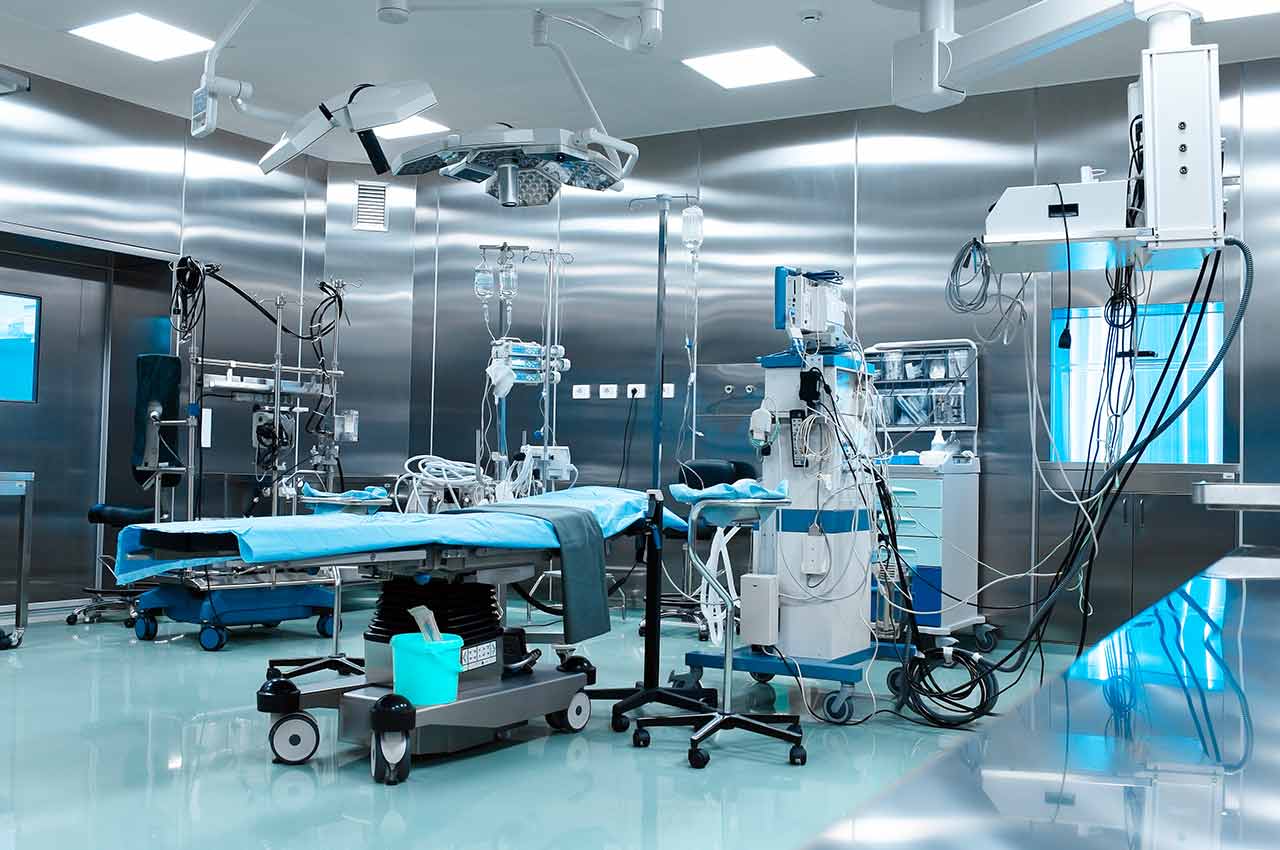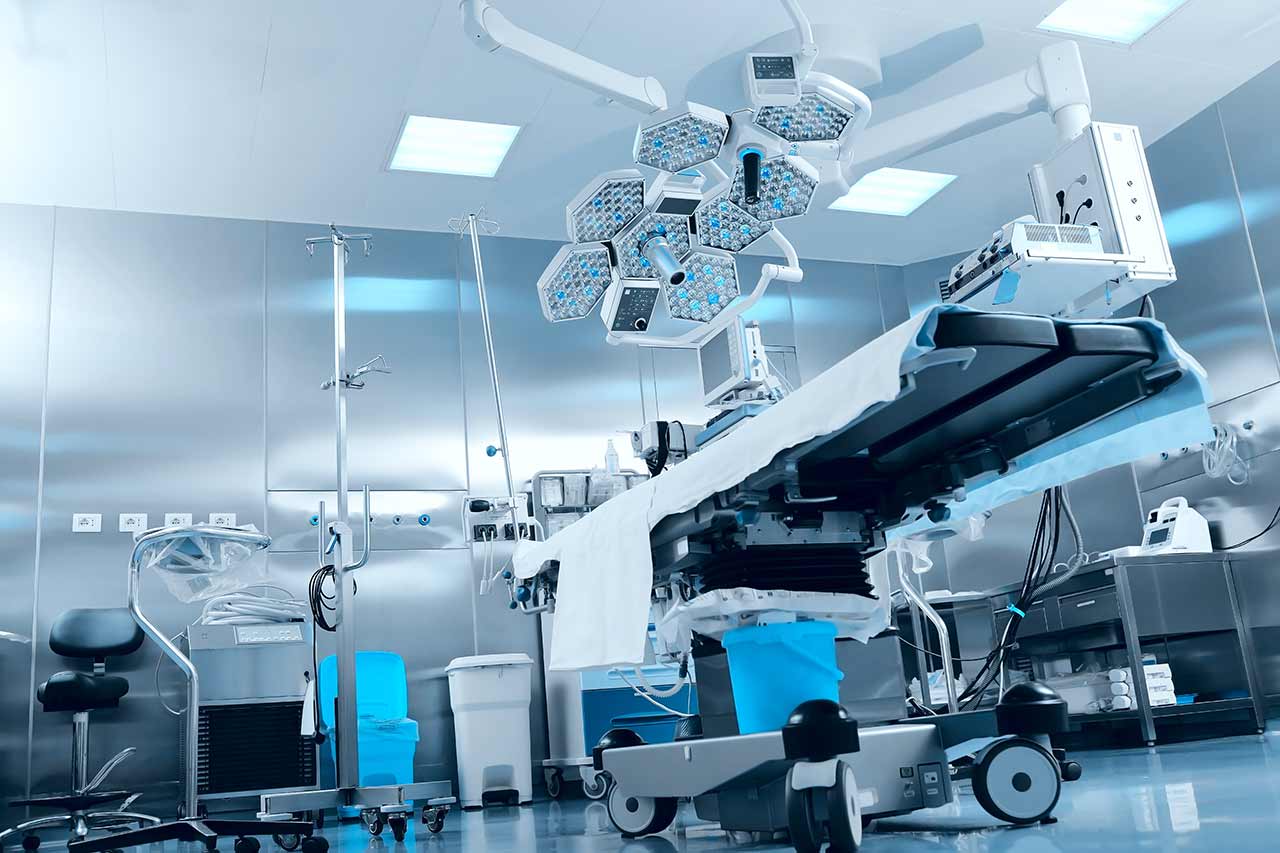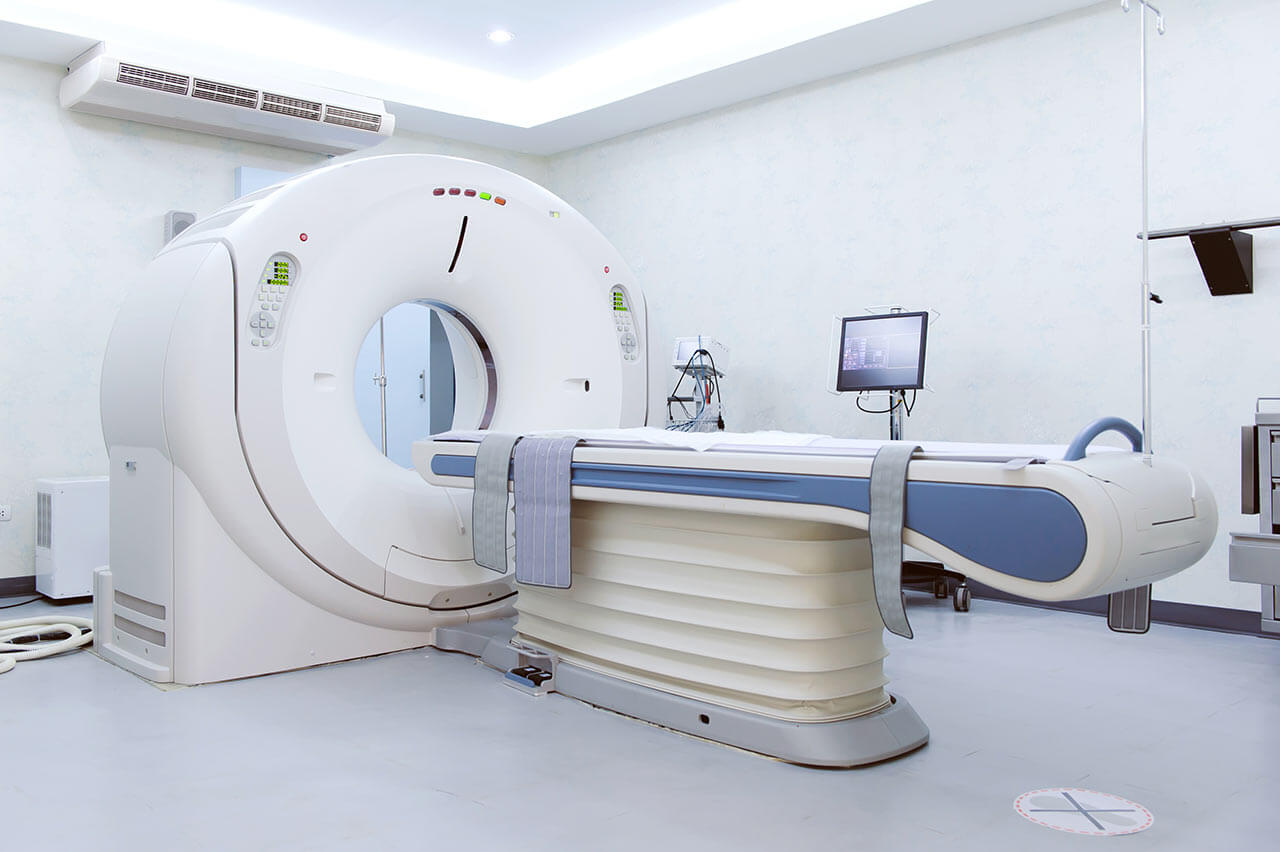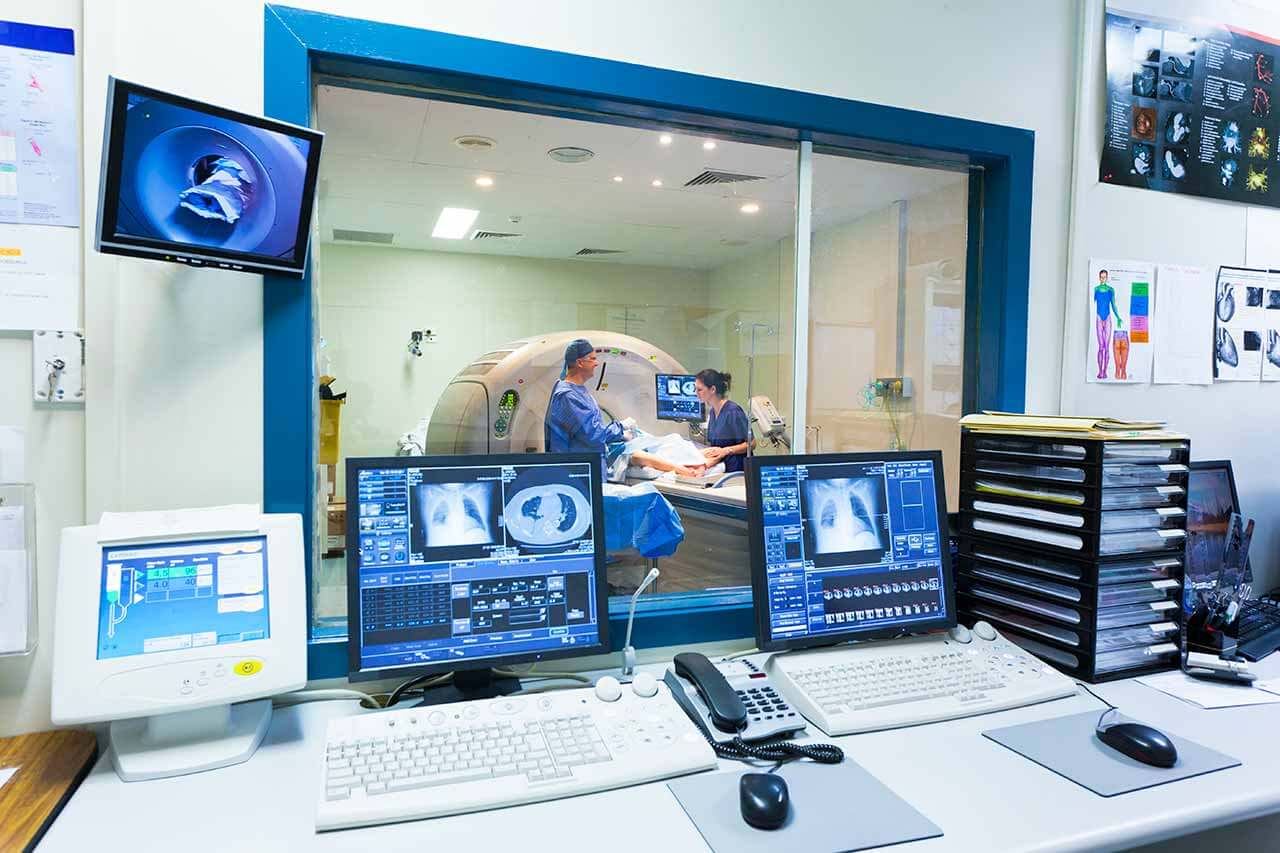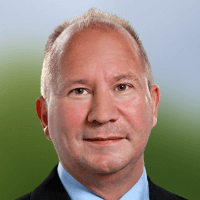
The program includes:
- Initial presentation in the clinic
- clinical history taking
- review of medical records
- physical examination
- laboratory tests:
- complete blood count
- general urine analysis
- biochemical analysis of blood
- TSH-basal, fT3, fT4
- tumor markers
- inflammation indicators
- indicators blood coagulation
- ultrasound of the neck and of lymph nodes
- CT/MRI scan of the mouth
- general otolaryngological examination
- preoperative care
- tumor resection
- histologically and immunohistochemically examination of the remote tissues
- symptomatic treatment
- control examinations
- the cost of essential medicines and materials
- nursing services
- full hospital accommodation
- explanation of future recommendations
Service
You may also book:
 BookingHealth Price from:
BookingHealth Price from:
About the department
The Department of Adult and Pediatric Oral, Maxillofacial Surgery, Facial Plastic Surgery at the University Hospital Frankfurt am Main offers the full range of diagnostics and surgical treatment according to its specialization. The therapeutic options vary from the treatment of traumatic injuries of the jaws and facial skull with the reconstruction of soft tissues to surgical interventions in diseases of the oral cavity, face and surrounding structures. Also, the department has successful experience in the field of interdisciplinary treatment of facial malformations, such as cleft lip and palate, congenital or acquired developmental anomalies of the jaws. The range is complemented by advanced methods of dental implantation and jaw bone reconstruction in elderly patients, as well as surgical treatment of temporomandibular joint diseases. The Chief Physician of the department is Prof. Dr. Dr. med. Robert Sader.
The department (in collaboration with the Department of Otolaryngology) operates the specialized Center for Head and Neck Tumors. With an annual number of more than 900 surgical interventions to remove head and neck neoplasms, this center is one of the largest medical facilities of this kind in Germany. During the treatment, the experts from related fields are also involved, for example, radiologists, oncologists, radiation therapists, neuroradiologists, dermatologists, etc. One of the key tasks of the center is the introduction of unified quality standards in the diagnostics and therapy, taking into account the current state of science. The department offers weekly tumor boards, during which an optimal treatment regimen is developed for each patient. If desired, it is possible to take part in clinical trials, which in certain cases help the patient to fully recover. The department performs operations of varying severity to resect benign and malignant tumors of the larynx and trachea, oral cavity and pharynx, salivary glands, jaw bone, face, lips and neck, nose and paranasal sinuses, skull base.
The main clinical focuses of the department include:
- Surgical treatment of dysgnathia (correction of the incorrect position of the jaw)
- Ultrasound-guided sparing surgery
- Corrective osteotomy with the use of removable plates for fixing the jaw, the repeated intervention is not required for their removal
- Individual treatment methods
- Surgical correction of craniofacial malformations
- Correction of the complete cleft lip and palate
- Surgical treatment of benign and malignant head and neck tumors (within the specialized center)
- Surgical resection of the tumor
- Reconstructive interventions to close defects after tumor removal (depending on the clinical indications, it can be combined with the tumor removal)
- Radiation therapy
- Chemotherapy
- Plastic reconstructive facial surgery
- Treatment of facial skull injuries
- Facial soft tissue injuries
- Facial bone fractures (midface, zygomatic bone, nose, mandible)
- Maxillofacial polytraumas
- Implantation of dental implants, including in patients after cancer pathologies, severe injuries of the face and jaw, cleft lip
- Dental surgery
- Tooth extraction
- Tooth preservation procedures, for example, resection of the root apex, retrograde root canal filling, root amputation, cyst removal, restoration of periodontal defects
- Periodontal surgery (interventions on the gums) to improve the position of the prosthesis, surgery to close the necks of the teeth
- Removal of lingual or labial frenulum
- Removal of salivary stones and treatment of salivary gland diseases
- Diagnostics and treatment of oral mucosal diseases
- Other medical services
Curriculum vitae
- 1980 - 1987 Study of Human Medicine at the Universities of Duesseldorf and Vienna.
- 1982 -1984 Study of Philosophy at the Universities of Dusseldorf and Vienna.
- 1998 Doctoral thesis defense and the title of Doctor of Medicine.
- 1987 - 1991 Study of Dentistry at the Universities of Bonn and Cologne.
- 1991 - 2002 Further training, Department of Oral and Maxillofacial Surgery, University Hospital Rechts der Isar Munich.
- 1995 Board certification in Oral and Maxillofacial Surgery.
- 1999 Habilitation, Oral and Maxillofacial Surgery.
- 2002 - 2004 Leading Senior Physician, Section of Oral and Maxillofacial Surgery in the Department of Reconstructive Surgery, University Hospital Basel.
- Since 2004, C4 Professor and Head of the Department of Adult and Pediatric Oral, Maxillofacial Surgery, Facial Plastic Surgery at the University Hospital Frankfurt am Main.
- Since 2008 President of the Frankfurt Dental Association "Zahnärztlichen Vereins zu Frankfurt 1863".
- Since 2009 President of the German Society for Aesthetic Dentistry.
- Since 2010 Dean for Students’ Clinical Activities.
Clinical Focuses
- Interdisciplinary treatment of facial malformations.
- Innovative technologies – from molecular medicine to computerized surgery.
Photo of the doctor: (c) Universitätsklinikum Frankfurt
About hospital
According to the reputable Focus magazine, the University Hospital Frankfurt am Main ranks among the top German medical facilities!
The hospital was founded in 1914 and today is a well-known German medical facility, which combines rich traditions and scientific innovations. A medical team of more than 6,500 employees cares about the health of patients around the clock, ensuring them with the highest standards of medical care and best possible safety.
The hospital has 32 specialized departments and more than 20 research institutes, which have all the necessary resources for the provision of the most effective care for any patient. The hospital has 1,488 beds for inpatient medical care. The medical facility diagnoses and treats more than 51,000 inpatients and about 44,800 outpatients every year. Due to the demonstration of outstanding treatment results, the number of patients seeking medical care here increases significantly annually.
The hospital presents all areas of modern medicine, whereas its special competence lies in neuroscience, oncology, cardiovascular medicine, cardiac surgery and other fields. Many treatment methods available here are unique not only in Europe, but also internationally.
Photo: (c) depositphotos
Accommodation in hospital
Patients rooms
The patients of the University Hospital Frankfurt am Main live in comfortable rooms made in modern design and meeting the highest standards of European medicine. Each room is equipped with an ensuite bathroom with a toilet and a shower. The standard room includes a comfortable, automatically adjustable bed, a bedside table, a wardrobe, a table and chairs for receiving visitors and a TV. If desired, patients can use Wi-Fi. The patients can also stay in the enhanced-comfort rooms.
Meals and Menus
The patient and his accompanying person have a daily choice of three menus. If for any reason you do not eat all the food, you will be offered an individual menu. Please inform the medical staff about your dietary preferences prior to the treatment.
Further details
Standard rooms include:
Religion
Religious services are available upon request.
Accompanying person
During the inpatient program, an accompanying person may stay with you in a patient room or in a hotel of your choice.
Hotel
During the outpatient program, you may stay in a hotel of your choice. Managers will help you choose the most suitable options.
